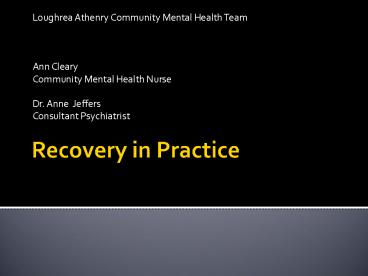Recovery in Practice - PowerPoint PPT Presentation
1 / 23
Title:
Recovery in Practice
Description:
Dr. Anne Jeffers. Consultant Psychiatrist. Empowering the Family ... Models for Practice Anne Jeffers. Experience and Benefits of a Relatives Group. 4. Hope ... – PowerPoint PPT presentation
Number of Views:24
Avg rating:3.0/5.0
Title: Recovery in Practice
1
Recovery in Practice
- Loughrea Athenry Community Mental Health Team
- Ann Cleary
- Community Mental Health Nurse
- Dr. Anne Jeffers
- Consultant Psychiatrist
2
Reaching Recovery
- Empowering the Family
- Experiences of
a Carers Group Ann Cleary - Services in Partnership with the Family
- Models for Practice
Anne Jeffers
3
Empowering the Family
- Experience and Benefits of a Relatives Group
4
Five keys used in recovery
Hope
Taking responsibility
Education
Supports
Self Advocacy
5
Meeting Family/Carer Needs
- Care Coordination and Care Planning vehicles to
support collaboration - Information
- Education- coping skills
- Recognition
- Support
6
Family Issues
- Burden of Care
- Key Needs of Carers
- Support
7
Relatives Thoughts on their Role
- Helplessness
- Confusion /frustration on their role
- Feeling diagnosed
- Caring is constant 24 hr
- Profound Sadness/guilt feelings
- No respite
- No peace-fear
- Need to Protect/embarrassment
- Nervous about sharing- being judged
8
What Supports help families?
- Mental health professionals who listen, provide
- information
- Access to respite
- 24 hour telephone support
- 7 day week service
- Involvement in hospital care-discharge meetings
- Multidisciplinary team involvement
- Work and structure for service users.
9
What support help Families (cont)
- Role recognition
- Emotional support on journey
- Help dealing with Emotional distress
- Learn personal coping strategies
- Information
- Regular contact with key worker
- Feeling not alone
10
Benefits of Relatives Group
- Promotes self-care
- Significant improvement in family
- functioning
- Fostering notion of Recovery
- Focus on strengths/instillation of hope
- Support from fellow experts
- Empowerment.
11
Empowerment
- Representation on Working Groups
- Attendance at regional conferences
- Guest speakers at NUIG teaching
- Chair of Western Consumer Panel
- Social Aspect
12
Family Partnership with the Services on the
Journey to Recovery
13
Definition Of Recovery
- a deeply personal, unique process.a way of
living a satisfying, hopeful and contributing
life even with limitations caused by illness
(Anthony, 2003)
14
Recovery Model
Traditional Model
DEPENDENT/ UNAWARE DEPENDENT/ AWARE
INDEPENDENT/ AWARE INTERDEPENDENT AWARE
STAGES OF R.P.
Distressing Experience
Psychopathology
Person Centred
Disorder Centred
Pro Health
Anti Disease
Strengths Based
Treatment Based
Experts by Experience
Doctor and Patient
Personal Meaning
Diagnosis
Recognition
Understanding
Compliance
Choice
Treatment
Growth and Discovery
Return to Normal
Transformation
Expert Care coordinator
Self Management
Professional Accountability
Personal Responsibility
15
Community
Person with experience of illness
Services
Family
EDUCATION THROUGH COMMUNICATION
16
Models for Practice
- Stress Vulnerability Model
- Explains why the
person has symptoms - Wellness Recovery Action Plan
- Explains
how the person maintains -
wellness
17
Stress/Vulnerability Model
- Individuals respond and adapt to stress in
various ways, unique to the individual - All individuals respond by breaking down if
stress is sufficiently high and for a sustained
period - Different individuals are more or less vulnerable
at a given level of stress
18
Stress Vulnerability Model
STRESS
VULNERABILITY
PROTECTIVE FACTORS
- SCHOOL,COLLEGE
- WORK
- HOME
- RELATIONSHIPS
- FINANCE
- ALCOHOL
- ILLICIT DRUGS
- PHYSICAL ILLNESS
- CHILDHOOD TRAUMA
- GENETIC RISK
- POOR COPING
- STRATEGIES
- ILLICIT DRUGS
- ALCOHOL
- FAMILY SUPPORT
- MEDICATION
- MH Professional
- HEALTHY DIET
- COPING SKILLS
- WELLNESS PROGRAM
19
Stress Vulnerability Model
-
SYMPTOMS
S T R E S S
NO SYMPTOMS
VULNERABILITY
20
Scales of Wellness
- RESPONSIBILITY
HOPE
STRESS
RISK
Protective Factors
EDUCATION
support
Self advocacy
21
Wellness Self Management Plan
- Daily Maintenance Plan
Wellness Tools - Identifying Triggers and an Action Plan
- Identifying Early Warning Signs and an Action
Plan - Signs that Things Are Breaking Down and an
Action Plan - Crisis Planning
- Post Crisis Planning
22
Practice in Partnership
- Biological, Psychological and Social
Interventions by a Multidisciplinary Team - Identify individual and family strengths and
needs - Incorporate these in Recovery Care Plan
- Introduce Wellness Self Management Plan
23
COMMUNITY
Service User
HOPE RESPONSIBILITY EDUCATION SUPPORT SELF
ADVOCACY
Services
Family
EDUCATION THROUGH COMMUNICATION































